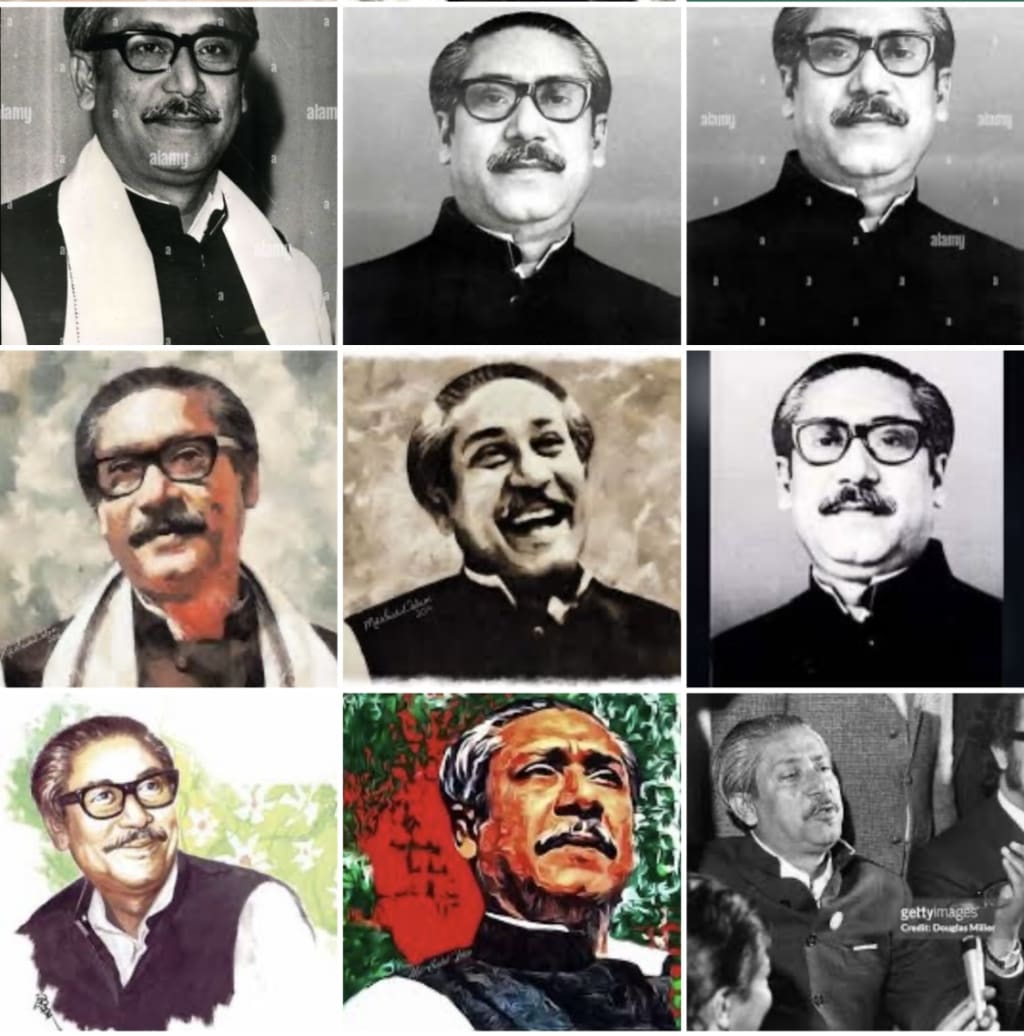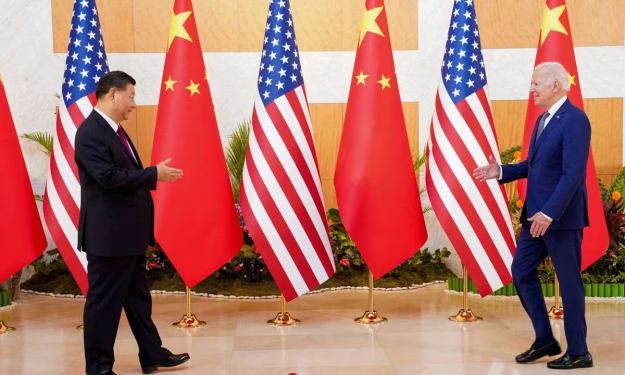Father of the Nation Bangladesh
Bangabandhu Sheikh Mujibur Rahman

Bangabandhu Sheikh Mujibur Rahman (1920-1975) is widely recognized as the founding father of independent Bangladesh. He was born on 17th March 1920 in the village of Tungipara, which falls under the Gopalganj Sub-division (currently district) in Faridpur district. Sheikh Mujibur Rahman's father, Sheikh Lutfar Rahman, served as a serestadar in the civil court of Gopalganj.
Sheikh Mujibur Rahman completed his matriculation from Gopalganj Missionary School in 1942. He then pursued his IA (Twelfth Grade) from Islamia College, Calcutta in 1944, and later obtained his BA degree from the same college in 1947. In 1946, he was elected as the general secretary of the Islamia College Students Union. Throughout his academic journey, Sheikh Mujibur Rahman actively participated in the Bengal Provincial Muslim League and became a member of the All-India Muslim League Council from 1943 onwards.
Bangabandhu Sheikh Mujibur Rahman played a significant role in the political landscape of Bangladesh. He was a key figure in the formation of various political organizations. He was a founding member of the East Pakistan Muslim Students League, which was established in 1948. Additionally, he served as one of the founding joint secretaries of the East Pakistan Awami Muslim League, which was formed in 1949.
His dedication and leadership skills led him to become the general secretary of the Awami League from 1953 to 1966. Later, he assumed the role of the president of the Awami League from 1966 to 1974. During the period of Bangladesh's struggle for independence, he served as the president of Bangladesh in absentia from 26 March 1971 to 11 January 1972.
After the liberation of Bangladesh, he became the Prime Minister of the country from 1972 to 24 January 1975. Subsequently, he took on the role of the president of Bangladesh from 25 January 1975 to 15 August 1975. Bangabandhu Sheikh Mujibur Rahman's contributions to the nation will always be remembered and revered.
He had been a supporter of the Suhrawardhy-Hashim faction of the Muslim League, demonstrating his activism. During the 1946 general elections, Mujib was chosen by the Muslim League to campaign in the Faridpur District. Bangabandhu Sheikh Mujibur Rahman played a significant role in establishing the East Pakistan Muslim Students League in 1948. Following the partition in 1947, he enrolled in the University of Dhaka to pursue a law degree. However, his studies were cut short when he was expelled from the university in early 1949. The reason for his expulsion was his alleged involvement in inciting the fourth-class employees to protest against the university's neglect of their rightful demands.
Bangabandhu Sheikh Mujib commenced his active political career by being elected as one of the joint secretaries of the East Pakistan Awami Muslim League in 1949. Following this, he was imprisoned in Faridpur jail as a political prisoner. In 1953, Sheikh Mujib was elected as the general secretary of the East Pakistan Awami Muslim League, a position he held until 1966 when he became the president of the party. Similar to his political mentor Huseyn Shaheed Suhrawardy, Mujib emphasized the significance of party organization and management. In order to organize the party, he resigned from the Cabinet of Ataur Rahman Khan (1956-58) and dedicated himself to the task of strengthening the party at the grassroots level. Sheikh Mujib, a charismatic organizer, successfully established his firm control over the party. Despite the fact that his political guru, HS Suhrawardy, favored keeping political parties inactive and working under the political alliance known as the National Democratic Front, Mujib had the determination to revive the Awami League. In 1954, Sheikh Mujibur Rahman entered parliamentary politics by being elected as a member of the East Bengal Legislative Assembly on the united front ticket. He also served as a member of the Pakistan Second Constituent Assembly-cum-Legislature from 1955 to 1958. Sheikh Mujib was a pragmatic politician who consistently advocated for the interests of the Bengali people within the Pakistani state. He was among the first language prisoners and gradually gained political prominence in the early 1960s. Through his organizational skills, Mujib was able to rescue the Awami League from a series of defections and the departure of various factions from the main party. He restructured the Awami League and established a strong foundation for it. In 1966, he introduced his renowned six-point program, known as 'Our [Bengalis'] Charter of Survival', which aimed to achieve self-rule for East Pakistan. This program directly challenged the dominance of West Pakistan and immediately captured the attention of the nation.
Despite facing opposition from conservative factions within all political parties, the younger generation, especially students, youth, and working classes, were immediately captivated by it. Sheikh Mujib's radical political views unsettled the Ayub regime, leading to his imprisonment. He was charged with sedition in the Agartala conspiracy case. It is worth mentioning that Mujib spent a significant portion of Ayub's rule behind bars, first from 1958 to 1961 and then from 1966 to early 1969. During his second term in prison, Mujib's charisma grew exponentially, resulting in a massive uprising in his support in early 1969. As a result, the Ayub administration was compelled to unconditionally release him on 22 February 1969.
On the day following his release, the Sarbadaliya Chhatra Sangram Parishad (All Parties Students Action Committee) organized a grand reception for him at Ramna Racecourse (now known as Suhrawardy Uddyan) and bestowed upon him the title 'Bangabandhu' (Friend of the Bengalis). They recognized him as a true leader who had endured twelve years of imprisonment during the twenty-three years of Pakistani rule. For Sheikh Mujib, those twelve years in jail and ten years under close surveillance in Pakistan felt more like a prison than a free homeland. The general elections held in December 1970 established Bangabandhu Sheikh Mujibur Rahman as the sole representative of East Pakistan. The people had given him an overwhelming mandate in support of his six-point doctrine, and now it was his responsibility to implement it. Mujib was so committed to the six-point plan that on January 3, 1971, he solemnly held a ceremony at Ramna Racecourse, attended by all the representatives from East Pakistan, where he took an oath to never deviate from the principles of the six-point idea while drafting the constitution for Pakistan. Mujib's unwavering stance on the six-point program alarmed ZA Bhutto and Yahya's military junta, leading them to adopt a strict approach. Instead of allowing Sheikh Mujib to form the government, the junta decided to nullify the election results. President Yahya Khan unilaterally canceled the National Assembly meeting scheduled to be held in Dhaka on March 3, 1971. This announcement marked the beginning of the end for Pakistan. Mujib called for a comprehensive non-cooperation movement in East Pakistan, which received widespread support from the entire province. During the period of non-cooperation from March 2 to March 25, 1971, Sheikh Mujibur Rahman effectively assumed control over all civil authorities in East Pakistan, becoming the de facto head of the provincial government.On 7 March, Mujib delivered a historic speech at a massive gathering at the Race Course, which marked a significant turning point in the history of the Bengali nation. During his address, Mujib accused the Martial Law authorities of failing to transfer power to the elected representatives. He concluded his speech with a powerful call to action, urging the people to defend themselves against the Pakistani enemy and to remember the sacrifices made for their freedom. Mujib declared that the struggle for independence was the struggle for their emancipation, and that they would continue to fight until they achieved their goal.
On 15 March, General Yahya Khan and other leaders from West Pakistan arrived in Dhaka to initiate a dialogue with Sheikh Mujib and his party. The dialogue began the next day and continued intermittently until 25 March. Despite this, non-cooperation and hartals persisted. From 2 March, students and leaders of various political parties had been declaring independence, which continued until 25 March. At midnight on 25 March 1971, the Pakistan army launched a brutal crackdown in Dhaka, resulting in Sheikh Mujib's arrest and confinement at Dhaka Cantonment. He was later taken to West Pakistan to face trial for sedition and inciting insurrection. Despite being a prisoner during the war of liberation, Bangabandhu was made the President of the provisional government, known as the mujibnagar government, formed on 10 April 1971 by the people's representatives to lead the Liberation War. He was also appointed as the Supreme Commander of the Armed Forces, albeit in absentia. During the War of Liberation, Sheikh Mujib's charm served as a unifying force for the nation, providing strength and inspiration. Following the liberation of Bangladesh from Pakistani occupation on December 16, 1971, Sheikh Mujibur Rahman was released from prison in Pakistan and made his way to Dhaka via London on January 10, 1972. As the leader of the first government in post-liberation Bangladesh, Bangabandhu Sheikh Mujibur Rahman faced numerous challenges in rebuilding a country devastated by war. His administration had to address issues such as restoring law and order, rehabilitating war veterans, repairing the damaged communication system, protecting those who were opposed to the war, and most importantly, providing food for the millions of hungry citizens. Despite these difficulties, Sheikh Mujib's charismatic leadership led to Bangladesh gaining recognition from the international community, including the United Nations. Tragically, Sheikh Mujibur Rahman was assassinated on August 15, 1975, along with most of his family members, except for his two daughters who were abroad at the time. His eldest daughter, Sheikh Hasina, currently serves as the Prime Minister of Bangladesh.
About the Creator
Humayun Rashid
my confidence is my best accessory..






Comments
There are no comments for this story
Be the first to respond and start the conversation.